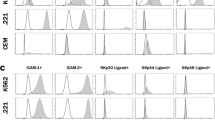Abstract
A limitation in the ability to analyze the function of the natural killer cell Ly49 and other receptors is the lack of antibodies to most of them. Even when monoclonal antibodies (MAbs) have been generated, they do not always react with a given receptor from all strains of mice. For example, 5E6 binds to Ly49C and/or I from B6, C3H, and NZB strains, but fails to react with any NK cells of 129, C57BR, C58, or FVB mice. Besides Ly49 receptors, NKR-P1 receptor gene products (NKR-P1B) also contain an (immunoreceptor tyrosine-based inhibiting motif (ITIM) in the cytoplasmic domain (1). In the human system, the NKG2 family of receptor molecules with or without ITIMs associate as heterodimers with CD94 molecules (2), and are therefore candidates for murine non-Ly49 receptors for class I antigens. Molecules similar to human killer cell immunoglobulin-like receptors (KIRs) have not been cloned in mice. Other receptors receive activating or positive signals and therefore may have important NK cell functions (3,4). We describe here our approaches to develop anti-NK cell antibodies to study their receptors.
Access this chapter
Tax calculation will be finalised at checkout
Purchases are for personal use only
Similar content being viewed by others
References
Ryan J. C. and Seaman W. E. (1997) Divergent functions of lectin-like receptors on NK cells. Immunol. Rev. 155, 79–89.
López-Botet M. Pérez-Villar J. J., Carretero M. Rodriguez A., Meleero I., Bellón T., Llano M., and Navarro F. (1997) Structure and function of the CD94 C-type lectin receptor complex involved in recognition of HLA class I molecules. Immunol. Rev. 155, 165–174.
Garni-Wagner B. A., Purohit A, Mathew P. A., Bennett M., and Kumar V. (1993) A novel function-associated molecule related to non-MHC-restricted cytotoxicity mediated by activated natural killer cells and T cells. J. Immunol. 151, 60–70.
Karlhofer F. M. and Yokoyama W. M. (1991) Stimulation of murine natural killer (NK) cells by a monclonal antibody specific for the NK1.1 antigen. IL-2 activatied NK cells possess additional specific stimulation pathways. J. Immunol. 146, 3662–3673.
Sentman C. L., Hackett J. Jr., Moore T. A., Kumar V., and Bennett M. (1989) Pan natural killer cell monoclonal antibodies and their relationship to the NK1.1 antigen. Hybridoma 8, 605–614.
Posner M. R. (1982) An enzyme-linked immunosorbent assay (ELISA) for the detection of monclonal antibodies to cell surface antigens on viable cells. J. Immunol. Methods 48, 23–31.
Lai W. C., Bennett M., Pakes S. P., and Murphree S. S. (1991) Potential subunit vaccine against Mycoplasma pulmonis purified by a protective monclonal antibody. Vaccine 9, 177–184.
Author information
Authors and Affiliations
Editor information
Editors and Affiliations
Rights and permissions
Copyright information
© 1999 Humana Press Inc.
About this protocol
Cite this protocol
Lai, W.C. et al. (1999). Generation of Antibodies to Cell Surface Markers on Mature Natural Killer Cells. In: Campbell, K.S., Colonna, M. (eds) Natural Killer Cell Protocols. Methods in Molecular Biology, vol 121. Humana Press. https://doi.org/10.1385/1-59259-044-6:211
Download citation
DOI: https://doi.org/10.1385/1-59259-044-6:211
Publisher Name: Humana Press
Print ISBN: 978-0-89603-683-3
Online ISBN: 978-1-59259-044-5
eBook Packages: Springer Protocols




